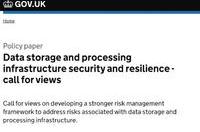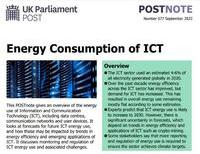techUK Data Centres Programme Overview 2022
At techUK, we help build strong relationships in a community of interest around the sector to expand networks and create business opportunities. We bring together industry and policymakers to work collaboratively and help improve external perceptions of the sector. Through our programme, we foster thought leadership as our members share technical knowledge and best practice towards achieving sector goals such as sustainability and net zero.
We intervene on policy, we mitigate regulatory impacts and we raise awareness. We have changed UK law and negotiated a tax concession worth over £200M for operators, we have reduced regulatory burdens, identified and mitigated business risks, established a community of interest and shared technical knowledge. We have educated the sector about policy and we have educated policy makers about the sector.
What We’ve Achieved
Despite 2022 having been a fairly tumultuous year for the UK’s economy, society and planet, this was a positive year for the data centre programme, with lots of new challenges and a change of leadership
GLA Engagement and West London Energy Stakeholders

Throughout the year, techUK hosted 3 roundtables between the DC programme and the Greater London Authority on issues of power supply, London’s digital plan, West London energy issues and planning. These took place in April, July and October. We have a fourth roundtable in a planning phase. We also hosted roundtables with the GLA and separately to discuss heat networks and the West London Local Area Energy Plan.
Following delays to power provisioning for new DC projects, particularly relevant in West London, techUK arranged a series of engagements with the OPDC, SSEN, National Grid and DCMS. These focussed on the delays to provision of power connections to the data centres being built in the West London area. These talks met a confluence with issues of energy security in the second half of 2022, and press coverage of data centre energy demand in the summer press, slowing progress. For now, hastening connection times remains a priority for 2023.
Planning issues have also been discussed with the GLA town planners but remain at an early stage. Whilst unfocussed demands from the GLA/OPDC, and stakeholder crowding has led to a re-treading of similar issues at times we are looking forward to progressing this in a more structured setting in 2023. Heat offtake from commercial data centres remains a ‘hot’ issue within planning, with operators wishing to help, but the financial incentives and retrofit technology not existing to make it a reality at present.
We have however made significant steps in understanding of these barriers in our public sector colleagues, and the issue of heat networks remains a priority to get right. Collaboration on the West London Local Area Energy Plan (LAEP) with Arup has also been hampered by short timelines and competing interests, although we expect to continue working with them next year.
Sector Energy Resilience & Government Contingency Planning for Power Supply Shortages
Energy resilience became a key topic for the data centre sector this year, relating to both power provisioning delays and significant hikes in the wholesale price of energy. Conversations with DCMS, ENA, SSEN and the EA have been productive in improving the resilience of the sector in the face of these issues.
techUK made progress in highlighting the issues facing the sector under existing government guidance on rolling blackout scenarios (ESEC). Originally there was a lack of understanding of the potential impacts of an unprotected data centre sector in government contingency planning for said blackouts, and a grey area between protected site status and priority diesel resupply status that we had hoped to clarify.

techUK was able to collect evidence for DCMS on the sectors diesel and HVO demand/use in support of a push for protected diesel resupply status, however, the outcome of these attempts remains unclear at this point (Dec 22). The techUK team were able to advise operators on what ESEC would mean for their operational sites and chased some queries relating to sites not listed in the ESEC directory.
Blackout rumours were met with concerns from operators over the air quality impacts and penalties of diesel generator use under such scenarios. Discussions are ongoing, but we so far have gained assurances from the Environment Agency (EA) that operators won’t be penalised for generator use in these scenarios and the sector is being considered alongside others for more advanced warning on planned blackouts.
The EA roundtable in November cleared up some misconceptions around the status of diesel permits under prolonged blackout scenarios, preparing the sector for the eventuality this winter. The issue of data centres in clusters, such as the Slough Trading Estate being on a single ESEC load block seems to be one that National Grid cannot easily remedy and techUK will focus on limiting impact from multi-generator impacts on air quality through internal discussions.
Media Engagement

Following a series of stories in national news outlets concerning the resiliency, energy demand, water demand and other aspects of the data centre sector, techUK set out some proactive positions to reframe the sector. This involved responding to some specific stories, particularly around the West London energy issues, alleged to be halting homes from being built, and engaging with journalists to inform them on the way the sector works and its drivers.
Over the space of a few months, techUK gave background to the Times, Bloomberg, the Financial Times, Computer Weekly and the Telegraph. This engagement helped build more informed and positive press relations for these issue. techUK established a comms channel for members to share press opportunities with the group and we are currently working on a guidance document for press enquiries into hot topics in the sector. We will continue this successful initiative into next year.
Better Regulation – DCMS Call for View

In the summer, DCMS launched several exercises to look at the resilience, security, and incident management of the ICT infrastructure sector. The key piece of work in this area was the Call for Views into Security and Resilience of Digital Infrastructure. techUKs response to this was completed alongside the cloud, cyber and telecoms programme with the DC programme holding the pen.
This was good stocktake of the state of digital infrastructure, provided members with an opportunity to give evidence on their proactive work on resilience and cybersecurity, and helped our partners at DCMS gain a better understanding of the data centre sector.
Alongside this DCMS has been testing the incident responses of the sector and conducting audits on specific sites security arrangements. These exercises were outside of techUK’s remit but we were able to advise and provide administrative support to members where necessary.
Parliamentary outreach – Energy use in the ICT Sector

In April we were approached to provide some comments on an upcoming Parliamentary POSTnote on energy use in the ICT sector. We gave many comments and suggestions on the draft resource, highlighting some myths and misunderstandings about the sector. Most of our contributions were accepted in the final publication which can be found here. We considering this an important win as this document will be a primary resource for MPs looking to learn more about the cloud and data centre sectors.
Priorities for 2023
UK Competitiveness
In 2023, work will continue on core issues like UK competitiveness, and techUK will continue to engage with government and key stakeholders to ensure the UK continues to be a business environment where the sector can flourish. This includes working to clarify with policymakers and regulators on sector compliance obligations and horizon scan to ensure we can reduce unnecessary burdens and any upcoming regulations in development.
Sector Resilience
Another priority will be to continue to ensure that the sector’s role as a backbone of the UK’s digital economy is correctly recognised. Therefore, we will engage government on security and the sector’s resilience, including plans for potential “Reasonable Worst Case Scenario” (RWCS) and power supply shortages. There will undoubtedly be lessons learnt, and more that can be done in planning ahead of next year’s winter, as energy supply and costs will continue to move up the agenda. Next year, we will also explore a potential Critical National Infrastructure Sector designation with government security agencies – CPNI (Centre for Protection of National Infrastructure) and NCSC (National Cyber Security Centre).
Energy and Sustainability

Energy and sustainability will continue to be a top priority for 2023, as we will focus on positioning the sector as a prosumer in the energy market, implementing the Energy Route map actions, engaging local government over power supply provisioning concerns so that data centres can truly underpin local digital growth.
In 2023, we will also focus on ESG+ and sustainability to ensure the sector takes the necessary steps (from designing and building sustainable data centres, to renewable energy supply and sustainable cloud) towards our ambitious net zero and climate change targets.
Skills

Skills shortages also continue to be a challenge for the sector, and it is clear that we need to do a better job of explaining our sector both to those for whom data centres may provide a rewarding career, and those who criticise the very facilities that do so much to support our economy. Therefore, given the success of our Schools Outreach initiative, we aim to take it forward in 2023 to continue to tackle the technical skills gap and addressing gender imbalance in the sector.
Governance and Contacts
techUK’s data centre programme is overseen by the techUK Data Centres Council which meets five times a year and sets strategic direction for the programme, agrees priorities and reviews activity. Council Terms of Reference, member bios, application criteria, meeting notes and papers are all available on request and our formal Council Communications can be found under the relevant topic headings in our publications index.
Further Information
The best place to look for information is our publications index where the first section includes past overviews
About techUK
techUK is the UK’s leading technology membership organisation, with more than 900 members spread across the UK. We are a network that enables our members to learn from each other and grow in a way which contributes to the country both socially and economically.





